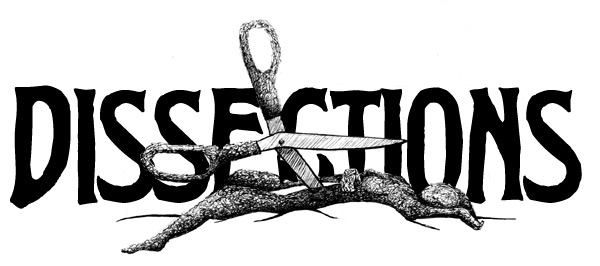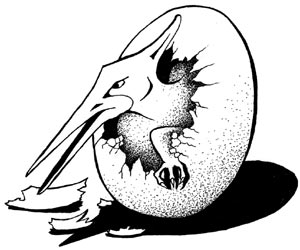[an error occurred while processing this directive]



Artwork: Keeper of Nightmares by Cathy Buburuz
House of Frankenstein
Bryan Dietrich
The father’s fingers stroke bone, coax coronal
sutures into orbits. His movements, precise
as pulsars, tease each temporal process
into place. Inca, arch, crista galli...
all ache for what order his palms imply.
Bones among bones—but living, like scalded
bats—hands pick and cluck through plastic
carrion, a clutter of fake phosphates
that lie strewn across the kitchen table
before him. Instructions. Glue. An empty glass.
It’s Christmas Eve. Hours only before dawn.
Quickly, each digit decides, parsing
parietal from palatine, cribriform
from cranium. Occipital, sphenoid (both
greater and lesser wings), canine, cuspid....
He must make sense of this. Find form. Already
he’s sent his wife, the other children, packing.
None anal enough. None worthy to worry
what lies intentionally broken. This face,
features fractured, this human constellation.
Forehead cumulous, shoulders pitched forward,
his fingers fondle ligula, linger like love
along the mylohyoid groove. Order
above all, he thinks. Mental eminence,
then mandible. Mind, always, over matter.
Before his only son rises, comes to claim
this skull, the father knows he must make it
last, so much like the organic matrix it models
that, later, finding it at the foot of the tree,
the boy will see among its fifty-four parts
fifty-four more. The hand that made his own.
*****************************************************************************************
The Creature Walks among Us
Bryan Dietrich
First, the house lights dim. The uncertain scream
of a stage door stabbed open. Then the curtain.
A boy wanders in, the kind who reads Creepy
by owl nightlight. Letting sneakers linger, appalled
but complicit at the head’s threshold, he follows
the sound, feels his way with hands flexed out before,
clumsy as a clubfoot mummy. The shower
shakes. A soapy scrim shoots back along its rod.
Now the skull, green as corpse gas, appears.
Hovering, gap-grinned, lip-lost. The hunt is on.
When, in the tall dark, my father would fade
into the flicker of bathroom fluorescents,
a bulge bigger than usual blistering
out under his shirt, I always knew what
came next. Father augury, fancy magic.
How many times—lusting after what, at seven,
I suppose I only half understood
of the grave—how many times did I ask,
“Daddy, do the skull thing,” pray for him
to steal into my closet, remove that molded
tomb jockey from its case and chase me down?
Along the hall, braving blind turns, through rooms
tricked to treachery by sunlessness and sister
litter, it, he, would dog my heels, the skull
scraping tracer lines, designs, across the dark
the way tree-dwelling owls trail fungal phosphor.
Signs of our own night flight lingered only
in what places we’d left, while the skull, my skull,
my father’s plastic mastery, haunted me still.
And ah, how I’d run, fretted to a fitful pitch,
tuned, twinned inside my head, shadowing
the shadows there, reflecting all—aglow
with terror and delight—I begged him for.
*****************************************************************************************
Psycho
Bryan Dietrich
We all go a little mad sometimes.
—Norman
Bates
If only there’d been no room at the inn,
no sheets to turn down, no shower to turn on.... If
only I’d missed that madness in her, the desire to be
apart, a private island.... Maybe if I’d met her before
I grew to understand Mother. Was the one
short life we spent together enough? No, eight
more, even a cat’s senseless span, multifoliate,
miraculous, unperturbed, would have been
short something, inevitably incomplete, wan
in the way it must have been for Joseph,
his wife given up to a greater need. Spoken for.
Some lovers are always already taken. Tab B
pretucked, slot A unsliced. No maybe.
No perhaps pointed enough to perforate.
When I met her, she was sweet camphor,
fragrant, volatile, ready to dissipate. Imagine
a Wagnerian God. Now imagine you’re deaf
to anything, any celestial yawp but that one
voice. You. Last priest, last acolyte of someone,
some thing, you can never hope to be,
become, belong to. Goddess. She. Aleph
and Tau, beginning and end. All that cannot sate.
That’s the irony. The nature of desire. In
my mansion you’ll find evidence. All I’ve done for
love. Here I’ve collected only that fear four
dimensions will allow. Really, it’s what anyone
does, dissecting what preys, what must begin
with father and mother, albatross and owl, bird and bee.
We cut it open, clean that great yaw, saturate,
stuff, suture, set it striding again as if
form freed what it once was, that flawless, deft
creature we, seeking still to be awed, trembled before.
I’ve preserved everything. How we met, ate,
how I showed her my office, the room, #1,
where I first cried watching her undress. Baby.
That’s what Mother still calls me. She knows my sin.
So, now, at the edge of the water, watching her slip away
letter by letter—NFB 418—I wonder that I dreamed it any
different.
This swamp, this skull, this locked, sunk trunk.... All that gives
us license.
*****************************************************************************************
The Monstrance
Bryan Dietrich
The glass people pictured there, pieced of fragment,
drew him that Candlemas to a low flame
not one of the windows truly contained—
rather, they only filtered the holy
light he found inside. There, in a filigree
of smoky amber, a priest’s movements stained
the haze with dark trails of absence, laid claim
to each space his hands had been. Strange oddments
which the monster could not name lay strewn about
the altar, called him further, past the door
and into rows of straight-backed pews the faithful
had abandoned as night drew down.
The priest, blind but beloved by his town,
took the stranger who had come so late—papal
oddity that he was—in hand and lured
him to a small room where the monster’s doubt
was comforted by a hole in the thin,
curtained wall. Here, just short of speech, tongued only
with motions, able grunts, with the blunt, lonely
mainstays of the mute, the monster named his sin.
Though they had found her, shaken, wet, a bit worse
for the river’s wear, the girl the town had thought
drowned, that reluctant flower the monster taught
to swim, was safe now, sound. No lasting curse
would hang about his flattish head, no Hail
Marys need be said, no rosaries counted,
no incense burned. The monster rose, departed
his room, turned one last time at the altar rail
and balked at a stick there with a ball, a bell
at its end where it rested against the stones.
Inside it, the priest said, were holy bones,
then laid it in his hand, a silver frail.